N149
Nimodipine
Synonym(s):
1,4-Dihydro-2,6-dimethyl-4-(3-nitrophenyl)-3,5-pyridinedicarboxylic acid 2-methoxyethyl 1-methylethyl ester, Isopropyl 2-methoxyethyl 1,4-dihydro-2,6-dimethyl-4-(m-nitrophenyl)-3,5-pyridinedicarboxylate
About This Item
Recommended Products
Assay
≥98% (HPLC)
form
powder
color
off-white to yellow
solubility
methanol: 62.5 mg/mL
45% (w/v) aq 2-hydroxypropyl-β-cyclodextrin: insoluble
H2O: insoluble
originator
Bayer
SMILES string
COCCOC(=O)C1=C(C)NC(C)=C(C1c2cccc(c2)[N+]([O-])=O)C(=O)OC(C)C
InChI
1S/C21H26N2O7/c1-12(2)30-21(25)18-14(4)22-13(3)17(20(24)29-10-9-28-5)19(18)15-7-6-8-16(11-15)23(26)27/h6-8,11-12,19,22H,9-10H2,1-5H3
InChI key
UIAGMCDKSXEBJQ-UHFFFAOYSA-N
Gene Information
human ... ADORA3(140) , CACNA1C(775) , CACNA1D(776) , CACNA1F(778) , CACNA1S(779) , CACNG1(786) , NR3C2(4306)
rat ... Adora1(29290) , Adora2a(25369)
Looking for similar products? Visit Product Comparison Guide
Application
- as a L-type calcium channel (LTCC) inhibitor, to evaluate its neuroprotective activity in the vibrosections
- as a standard, in the enantioseparation of chiral drugs by high performance liquid chromatography (HPLC)
- in the pharmacological studies for the measurement of spine voltage escape
Biochem/physiol Actions
Features and Benefits
Caution
Signal Word
Warning
Hazard Statements
Precautionary Statements
Hazard Classifications
Acute Tox. 4 Oral
Storage Class Code
11 - Combustible Solids
WGK
WGK 1
Flash Point(F)
Not applicable
Flash Point(C)
Not applicable
Personal Protective Equipment
Certificates of Analysis (COA)
Search for Certificates of Analysis (COA) by entering the products Lot/Batch Number. Lot and Batch Numbers can be found on a product’s label following the words ‘Lot’ or ‘Batch’.
Already Own This Product?
Find documentation for the products that you have recently purchased in the Document Library.
Customers Also Viewed
Our team of scientists has experience in all areas of research including Life Science, Material Science, Chemical Synthesis, Chromatography, Analytical and many others.
Contact Technical Service






![N(1)-dodecyl-N(3)-[3-(dodecylamino)propyl]-1,3-propanediamine AldrichCPR](/deepweb/assets/sigmaaldrich/product/structures/184/200/68c42cb5-3811-47e2-9f1f-8987743b0fce/640/68c42cb5-3811-47e2-9f1f-8987743b0fce.png)










